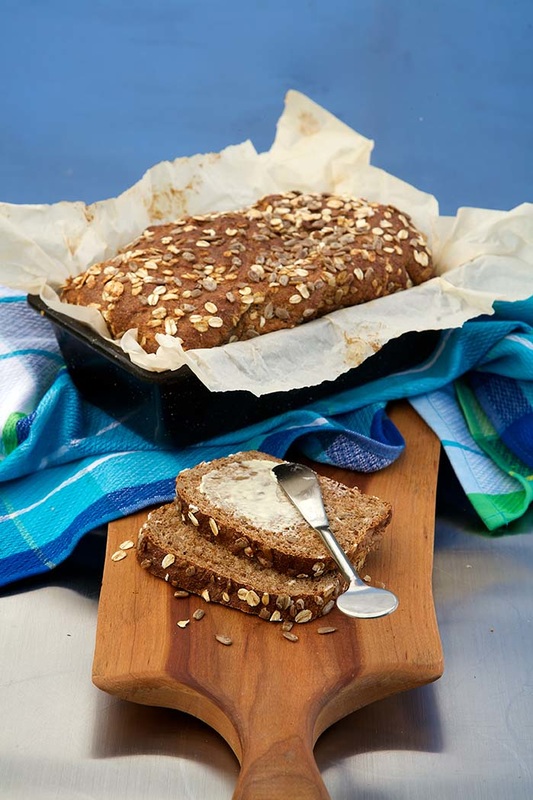|
Whole Wheat Seed Bread
Jan Main, PHEc Excerpted from Homegrown, by Mairlyn Smith. Reprinted with permission of Whitecap Books, 2015. “This wholesome loaf is a perfect accompaniment to soups and salads, not to mention freshly made preserves in the summer.” —Jan INGREDIENTS 3 cups (750 L) lukewarm water (approx. 100°F/38°C) 2 Tbsp (30 mL) traditional active yeast 2 tsp (10 mL) granulated sugar 1/3 cup (75 mL) liquid honey 1/4 cup (60 mL) canola oil 1 cup (250 mL) natural bran or wheat germ (see note) 1 cup (250 mL) quick oats 3/4 cup (175 mL) sunflower seeds 1 Tbsp (15 mL) iodized salt (see note) 6 cups (1.5 L) whole wheat flour (approx.) Additional oats or seeds to pat onto surface METHOD 1. Lightly oil two 9- × 5-inch (2 L) loaf pans or line with wet parchment paper, well wrung out (see p. 388). Set aside. 2. Rinse a very large mixing bowl with hot water to warm it up, then add the lukewarm water. 3. Sprinkle yeast and sugar over the water. Let stand about 10 minutes or until yeast becomes frothy. 4. Whisk in honey, oil, bran (or wheat germ), oats, sunflower seeds and salt (do not omit!). Using a wooden spoon, beat in flour 1 cup(250 mL) at a time, making sure you beat until the batter is smooth before adding more flour. When all the flour has been added, beat vigorously until well blended. Dough will be heavy and moist. 5. Divide dough in half and pat into the prepared pans. Sprinkle unbaked loaves with additional quick oats and sunflower seeds, pressing into the surface of each loaf. Cover loaves with a clean tea towel and let stand in a warm place for about 45 minutes or until risen. Note: this is a heavy bread so it won’t rise as high as a regular yeast bread. 6. About 5 minutes before the dough has risen, preheat oven to 375°F (190°C). Bake loaves for 40 to 45 minutes or until a deep golden brown. Loaves should produce a hollow sound when tapped. 7. Cool loaves on racks for 10 minutes before removing from pans. Cool completely before storing. Makes two 9-inch (2 L) loaves, 16 slices per loaf One serving = 1 slice Per serving: 147 Calories, 3.4 g Total Fat, 0.6 g Saturated Fat, 0 g Trans Fat, 297 mg Sodium, 24g Carbohydrate, 3.4 g Fibre, 6.8 g Sugars, 6 g Added Sugars, 7.4 g Protein, Carbohydrate Choices: 1 1/2 Want to make yeast breads but feel slightly intimidated by the cycle of kneading, waiting for the yeast to rise, and then kneading again? Batter breads to the rescue! Batter breads only rise once and don’t require a lot of kneading, but they still provide the same great yeast bread taste. Are you eating your Iodine? Iodine is an important trace mineral whose main function is to help the thyroid gland make thyroid hormones. Thyroid hormones are secreted into the blood and then carried to every tissue in the body. They help the body use energy, stay warm and they keep the brain, heart, muscles and other organs working on an even keel. The average Canadian adult requires 150 mcg per day. Without enough iodine you can develop a goiter, an enlargement of the thyroid gland that was common in Canada until the 1920’s when iodine was added to regular table salt. The best sources of iodine are found naturally in seafood and seaweed, as well as in dairy products. Smaller amounts are found in beans, eggs and whole grains. It is uncommon to develop an iodine deficiency if you are eating seafood on a regular basis, or if you regularly ingest seaweed, beans, dairy products, whole grains or eggs. In my experience, however, I have noticed that a large percentage of Canadians do not eat seafood on a regular basis (two to three times a week). Factor in diets that limit dairy products or people who avoid eating whole grains, beans and eggs, and I believe we have the makings of a perfect iodine deficiency storm. The recipes in this book are low to very low in sodium, but at least they aren’t low in iodine. Your taste buds may tell you that recipes need more salt, but before you start waving a salt shaker around like a fairy wand, bear in mind that 1/4 tsp (1 mL) iodized salt has 428 mg of sodium and 95 mcg of iodine. Note: To make sure that you are getting enough iodine, eat a well-balanced diet. Do not take an iodine supplement as it can interfere with other medications, and too much iodine is just as bad as too little. Check with your doctor is you think you might have an iodine deficiency. Ingredient Note : Iodized Salt—Salt has an important function in yeast development, so don’t omit it! Natural Bran/Wheat Germ— To make this a whole grain bread use 1/2 cup (125 mL) wheat germ and 1/2 cup (125 mL) natural bran. PHEC Tips: Bread may be served warm from the oven but needs to be cut into thick slices. It slices more easily if cooled.
0 Comments
Your comment will be posted after it is approved.
Leave a Reply. |
The Ontario Home Economics Association, a self-regulating body of professional Home Economists, promotes high professional standards among its members so that they may assist families and individuals to achieve and maintain a desirable quality of life. Categories
All
Archives
April 2024
|
|
Subscribe to our mailing list
|
|
Unsubscribe from our mailing list
|
Copyright © 2023 Ontario Home Economics Association (OHEA). All Rights Reserved.



 RSS Feed
RSS Feed